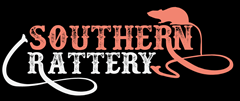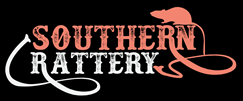You have the cage, the bedding, the toys, the water bottle, and the rats. But now you’re scratching your head wondering what in the world you can feed them.
Rats are omnivores which means they can eat just about anything. They consume 10% of their body weight per day on average. Adult male rats can reach 800 grams, and a female 500g if they are well fed. This means they respectively eat 80g and 50g of food per day.
High-grade commercial rat pellets should make up 90 percent of your pet rat’s diet, but fruits and vegetables can make up to 10 percent of their calories, according to the Veterinary Teaching Hospital at Michigan State University.
When introducing new foods to your pet use a mix of the new and old food. Gradually increase the amount of new food over a 7 – 10 day period. This prevents digestive upset as rats are unable to regurgitate and allows your rat to adjust to the new foods.
When in doubt, always check with your veterinarian.
Below is a comprehensive list of safe and non-safe foods for your rats.
Fruits
Apples. Be sure to remove the seeds as they are toxic for rats.
Applesauce. Preferably sugar free, all-natural applesauce.
Apricots
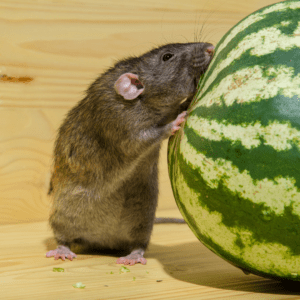
Avocados. Give in moderation.
Bananas. A rat fav! Especially when mashed and have other fruits and nuts added. Dried bananas are great for rats because they are high in potassium and give them something to chew which files their teeth.
Blackberries
Blueberries – They love them frozen in the summer!
Boysenberries
Cantaloupe
Cherries
Cranberries and Dried cranberries. If your rat is prone to urinary tract infections, this is great to add to its diet. Cranberries are good for keeping the urinary tract clean and healthy.
Cucumber
Grapes. Purple grapes are believed to prevent cancer in rats. Grapes and raisins are high in sugar so give in moderation.
Honeydew melons
Kiwi
Melons
Papaya
Peaches. Make sure to remove the pit from peaches because it can be harmful.
Pears
Plums
Pomegranates
Pumpkins. Pumpkins are fine for rats to eat. However, the seeds are high in fat and should be fed to your pet in moderation.
Raspberries
Strawberries. Rats love strawberries. They are not only sweet and yummy but also healthy for them.
Watermelon
Vegetables
Broccoli
Butternut squash. Make sure that the squash is thoroughly cooked before feeding it to your rat.
Carrots
Cauliflower
Celery. This vegetable is fine for rats, but it doesn’t have very much nutritional value.
Potatoes
Corn. Corn is good for your rats whether it is on the cob, from the can, or even frozen.
Green beans. Cooked green beans are very nutritious.
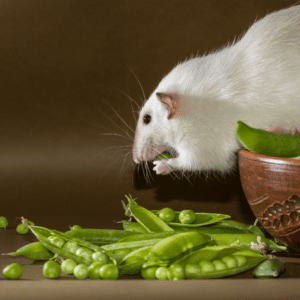
Green peppers
Kale
Lettuce – any kind except iceberg.
Peas
Red peppers
Squash. Cooked squash is best.
Sweet potatoes (cooked)
Yellow peppers
Dairy
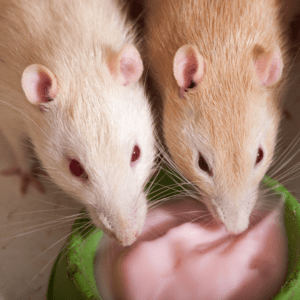
Cheese in moderation.
Cottage cheese
Eggs – scrambled eggs are a rat fav and are fantastic for pregnant does.
Yogurt. Probiotic yogurt in small amounts is good for gut flora.
Yogurt-covered pretzels
Yogurt drops
Grains
Dry rolled oats. Any type of oats is fine as long as it does not contain any sugar.
Oatmeal
Pasta – cooked or dried
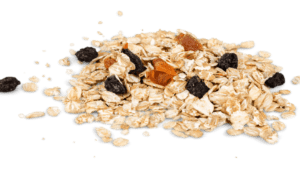
Rice. Brown rice is especially good for your rat.
Lentils
Cooked legumes
Black beans
Kidney beans
All large dry beans
Nuts and Seeds
Cashews
Pumpkin seeds
Sunflower seeds
Walnuts – in moderation
Meats
Beef in moderation.
Chicken – this is the best meat for them.
Chicken bones. Surprisingly, these are not only healthy for rats but also good chew toys. Next time you have chicken for dinner, save the bones.
Ham
Turkey
Foods to Avoid
These foods can be harmful or even fatal for your rats.
Alcohol
Apple seeds. Apple seeds have a small amount of cyanide in them that can be harmful for rats.
Avocado skin
Artichokes (raw)
Beans (uncooked). Destroys vitamin A and enzymes that rats need to digest protein and starches. This can cause red blood cells to clump and is a hazard for rats.
Beet tops. These can cause urinary tract problems and stones in the kidneys and bladder due to their extremely high levels of oxalates.
Blue cheese. The mold that is used to make blue cheese is toxic to rats.
Brussels sprouts (raw)
Carbonated drinks. Rats can’t burp, which is why they should never drink carbonated drinks.
Caffeinated drinks
Candy
Chocolate
Dried corn. While fresh corn is okay, dried corn is not. This is because it contains fungal contaminants that can lead to liver cancer in rats.
Garlic
Green bananas. While regular bananas are okay, green bananas inhibit starch digestion enzymes.
Green potato skins and eyes. These contain solanine, a toxin for rats.
Hamster food. Hamster food is high in fat.
Licorice
Mango
Onions (raw)
Oranges
Orange juice. Orange juice contains d-limonene, which can cause kidney cancer in male rats.
Peanuts
Poppy seeds
Potato eyes
Red cabbage (raw)
Rhubarb
Seaweed
Spinach. Due to the high levels of oxalates, spinach can cause urinary tract problems and stones in the bladder and kidneys.
Sweet potato (raw)
Tofu (raw bulk)
Wild insects. These should never be fed to your rat because they can carry diseases and internal parasites.
